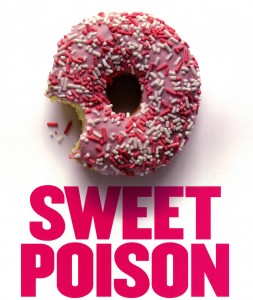Sugar: a "cheat" or a toxin?
As the weekend comes to an end it is possible (or maybe even likely) that you "cheated" over the weekend and had some food item or meal that you would not otherwise eat. Take a moment and figure out what made that item a "cheat"? Chances are it was because you considered the item to be calorically inefficient or not an every day occurrence. If the food item was actually poisonous you wouldn't even consider "cheating" right?
Robert Lustig, a specialist on pediatric hormone disorders and the leading expert in childhood obesity at the University of California, San Francisco gave a lecture called “Sugar: The Bitter Truth,” which was posted on YouTube It has been viewed well over 800,000 times, gaining new viewers at a rate of about 50,000 per month, fairly remarkable numbers for a 90-minute discussion of the nuances of fructose biochemistry and human physiology.
Lustig goes so far as to assert that sugar "is not just an empty calorie, he says; its effect on us is much more insidious. "It's not about the calories," he says. "It has nothing to do with the calories. It's a poison by itself." Gary Taubes' New York Times article Is Sugar Toxic? noted that "If Lustig is right, then our excessive consumption of sugar is the primary reason that the numbers of obese and diabetic Americans have skyrocketed in the past 30 years. But his argument implies more than that. If Lustig is right, it would mean that sugar is also the likely dietary cause of several other chronic ailments widely considered to be diseases of Western lifestyles — heart disease, hypertension and many common cancers among them."
The sugar discussion reached mainstream media when Sanjay Gupta (of 60 Minutes and CBS News) reported on new research showing that beyond weight gain, sugar can take a serious toll on your health, worsening conditions ranging from heart disease to cancer. Some physicians go so far as to call sugar a toxin. The clip below showcases some interesting studies and helps to further discuss the impact sugar has on us biologically.
Now that your sugar radar is likely firing overtime. Here is a list of some of the possible code words for “sugar” which may appear on a label. Hint: the words “syrup”, “sweetener”, and anything ending in “ose” can usually be assumed to be “sugar”. If the label says “no added sugars”, it should not contain any of the following, although the food could contain naturally-occurring sugars (such as lactose in milk)."
Agave NectarBarley Malt SyrupCorn sweetener
Corn syrup, or corn syrup solids
Dehydrated Cane Juice
Dextrin
Dextrose
Fructose
Fruit juice concentrate
Glucose
High-fructose corn syrup
Honey
Invert sugar
Lactose
Maltodextrin
Malt syrup
Maltose
Maple syrup
Molasses
Raw sugar
Rice Syrup
Saccharose
Sorghum or sorghum syrup
Sucrose
Syrup
Treacle
Turbinado Sugar
Xylose
Remember, your body doesn't care what the label says, it's all just "sugar"

No comments:
Post a Comment